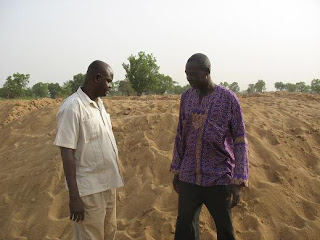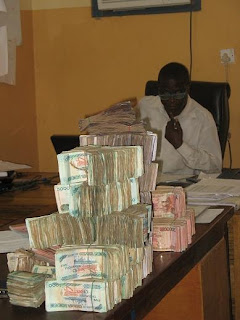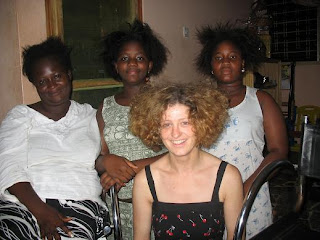 The students earnestly writing notes on the different parts of the computer.This is a Primary 4 class, quite a small class even though there are 3 to 4 students per computer - the bigger classes get a bit crowded.
The students earnestly writing notes on the different parts of the computer.This is a Primary 4 class, quite a small class even though there are 3 to 4 students per computer - the bigger classes get a bit crowded.
 Though I told the kids to "don't mind me" with my camera, one girl couldn't resist a smile!
Though I told the kids to "don't mind me" with my camera, one girl couldn't resist a smile!  "Teacher, teacher!" Every student wants to answer the question "what is the mouse?
"Teacher, teacher!" Every student wants to answer the question "what is the mouse?
The amazing miracle of Windows ...
Anyway, now Kwabena runs the place on a shoestring (well, non-existent!) budget. The Centre is in Fuo, a village in Tamale, which despite being close to town is just like a rural village. Most families in the village are very poor and try to make a living from one crop a year and the petty trading that the women carry out (like selling groundnuts, snacks, provisions, etc). Most kids are in school now that basic education is free, and they work after school selling or working small jobs here and there. But the local schools can't teach computers as they have no computers at the school (they don't have text books so computers is out of the question!). But some of the kids are very bright and most of them are mad about computers and would love to learn to use them, so the Centre has six computers, and four local primary schools and Junior secondary send some of the classes there to get computer classes. It's a very effective way to teach, because each week one teacher, Ernest, gives classes to about 200 children.
They have also just started running classes for adults in the afternoons when school is out, which the adults pay for, and that subsidises the children's free classes a bit. Some of the kids are especially bright and very good at computers, but they won't be able to go any further in school once they finish Junior Secondary because then the fees begin. For that reason Kwabena wants to start sponsoring "brilliant but needy" students (that's the technical term here!) to help pay for the costs associated with their education, and hopefully sponsor them as far as they can go in education. If they gain admission to university, they can then get a scholarship or a loan.
We have also been writing some proposals to try and get some funding from donors but so far have had no luck. If anyone knows any organisations we can try to apply, do let me know! As it is a small organisation, it seems the bigger donors are not so interested, so medium to small organisations would be better - I am open to all suggestions!!



























